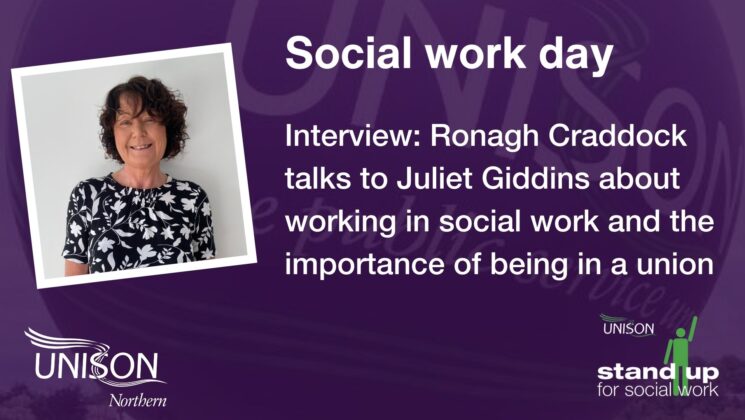Today is social work day! To acknowledge the day Ronagh Craddock talks to social worker Juliet Giddins about working in social work and the importance of being in UNISON.
RC: Can you tell us what appealed to you about working in social work and what the highlights are?
JG: My experiences as a child sparked an awareness in me of the impact that support can have on people’s lives, and an understanding of how hard some people’s lives can be. I have one memory that sticks out of when I was in junior school and a new girl arrived who had clearly been living in difficult circumstances and was not very well, I was asked to sit with her by a coal fire and the head teacher gave her some chocolate. I could see the girl had never eaten chocolate before and didn’t know what it was. It is simple things like that that make you realise as a child the differences and unfairness in people’s lives and how important it was that people got support, and that I wanted to help where I could.
I started my career working in residential care. From sitting in meetings with social workers during that role, it became clear to me the impact you can have on a child’s life by being the person managing a child’s case. From there I started my work in a local authority as a social worker, where I have stayed since.
Social work is a difficult area to work in at the moment but the highlight of working in social work is how rewarding it can be. It could be when you visit a child and they are so happy to see you. It could be seeing a positive change in a child’s life as a result of the support and input that has been given to a family.
RC: What are the key challenges facing the social work sector
JG: At the moment Covid-19 and the ongoing staff shortages are a challenge – over Christmas 4 out of our team of 5 were off work due to Covid. However, the biggest challenge is the devastating cuts to essential services by the national government and not having the resources that we need to be able to support families. It sometimes feels like the government expects us to be magicians and find support for people without any resources. What is really hard is seeing people not being able to put the heating on, particularly children wearing a hat and gloves inside to stay warm because if their parents put the heating on, they can’t afford to feed them. I think we have to be very careful in social work that we continue to recognise the word poverty and don’t replace or confuse it with the word neglect.
RC: Can you tell us a bit about how you got involved in UNISON and your roles?
JG: I came from a unionised family and I was always encouraged to join a trade union. UNISON was the first trade union I joined, when I was working in the community voluntary sector. There wasn’t a trade union culture in the workplace and so I paid my union subscription by direct debit so my employer would not know I was a member, because I was worried at the time. It turned out to be a very good decision because the support I received shortly afterwards from UNISON was invaluable – I was informed by my employer that I was being made redundant, a day after I had given birth, when I was still in hospital. I contacted UNISON who acted on my behalf and my employer at the time soon retracted my redundancy notice and provided me with a written apology.
That experience taught me the value of a union and I wanted to help others in the same way. When I started working for Gateshead local authority I signed up to be a workplace rep and I’ve been active in UNISON ever since then. Most recently I have been the regional lay representative on UNISON’s social care forum, where we met weekly and then fortnightly during covid-19 to respond to fast changing issues such as PPE shortages. I also chair our regional social work network for UNISON activists.
RC: What makes UNISON the union for social work?
JG: Being a registered social worker, you can sometimes be in a fragile position. Your registration is your career and the support from UNISON’s Professional Services Unit (PSU) is an absolute must to protect your registration. I have also supported members to access legal advice, sometimes urgently when needed, as part of their UNISON membership. All of our UNISON branches are very active and have so much knowledge and experience to help all members of the social work team.
Another reason UNISON is the union for social work is because UNISON is a majority women union (over 75%), and social work is a majority women profession. This is relevant because the rights of women at work are important for lots of my colleagues in social work, and it is important to have a union that understands that.
RC: What advice would you have for anyone new to working in social work?
JG: Join UNISON, link up with your local UNISON branch, develop resilience and keep a sense of humour. Never be frightened to ask for support from colleagues.

